

iPad danger: app v. web, consumer v. creator « BuzzMachine. I tweeted earlier that after having slept with her (Ms. iPad), I woke up with morning-after regrets.
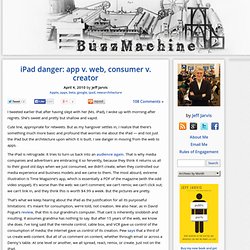
She’s sweet and pretty but shallow and vapid. Cute line, appropriate for retweets. But as my hangover settles in, I realize that there’s something much more basic and profound that worries me about the iPad — and not just the iPad but the architecture upon which it is built. I see danger in moving from the web to apps. The iPad is retrograde. That’s what we keep hearing about the iPad as the justification for all its purposeful limitations: it’s meant for consumption, we’re told, not creation.
The iPad’s architecture supports these limitations in a few ways: First, in its hardware design, it does not include a camera — the easiest and in some ways most democratic means of creation (you don’t have to write well) — even though its smaller cousin, the iPhone, has one. Second, the iPad is built on apps. So I see the iPad as a Bizarro Trojan Horse. There are alternatives. Prince: "The Internet Is Over" "I really believe in finding new ways to distribute my music," pop legend Prince told the Daily Mirror in an exclusive interview today.
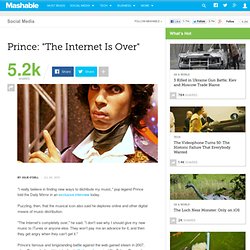
Puzzling, then, that the musical icon also said he deplores online and other digital means of music distribution. "The Internet's completely over," he said. "I don't see why I should give my new music to iTunes or anyone else. They won't pay me an advance for it, and then they get angry when they can't get it. " Will Wired Proclaim 'The Web is Dead?' “Le web est mort”, c’est Chris Anderson qui le dit. Je posais la question il y a deux semaines : Chris Anderson, le patron de Wired et auteur visionnaire de "The Long Tail", s'apprêtait à publier un édito consacrant "La Mort du Web".

Finalement, Wired a bien publié son "avis de décès". Dans un article à quatre mains appuyé par un graphique qui semble tout dire. Il montre la part déclinante du web dans l'ensemble des activités Internet : Et l'auteur de "Free" de prôner le "freemium", ce en quoi il n'a pas tort. Et la souscription face à la syndication RSS. "La question n’est finalement pas de savoir s’il faut investir dans une application ou dans un site web. The Web Is Dead. Long Live the Internet. Two decades after its birth, the World Wide Web is in decline, as simpler, sleeker services — think apps — are less about the searching and more about the getting.
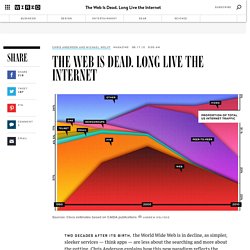
Chris Anderson explains how this new paradigm reflects the inevitable course of capitalism. And Michael Wolff explains why the new breed of media titan is forsaking the Web for more promising (and profitable) pastures. Who’s to Blame: Us As much as we love the open, unfettered Web, we’re abandoning it for simpler, sleeker services that just work. by Chris Anderson You wake up and check your email on your bedside iPad — that’s one app. You’ve spent the day on the Internet — but not on the Web.
This is not a trivial distinction. A decade ago, the ascent of the Web browser as the center of the computing world appeared inevitable. But there has always been an alternative path, one that saw the Web as a worthy tool but not the whole toolkit. The Web Is Dead? A Debate. O’Reilly to Anderson: It’s the back end that matters.
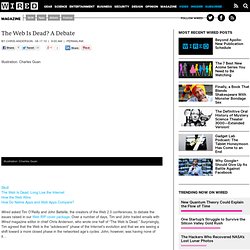
While there’s no question that both Facebook and the mobile app ecosystem provide clear challenges to “the web,” the idea that the browser front end was ever the key to the web’s dominance is so, well, 1995, from the days when Netscape thought that the “webtop” would displace the desktop. But the competitive action has always been on the internet as transport, with data-driven services as the back end. Back when I put on my first conference, the Perl Conference, in 1997, I was already talking about how the internet was becoming a vast repository of programmable services, that screen scraping and overloaded URLs were pointing towards a future internet operating system. And when I put on my “Building the Internet Operating System” conference in 2002, I was already focusing on how Peer-to-Peer distribution, distributed computation, and web services were pointing forward to something much bigger than we’d seen before. "So long" le Web ? (C'est "Wired" qui le dit)
Le Web est mort, vive Internet ?
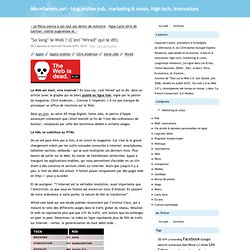
En tous cas, c'est 'Wired'' qui le dit, dans un article (avec le graphe qui va bien) publié en ligne hier, signé par le patron du magazine, Chris Anderson... Comme il l'espérait :) il n'a pas manqué de provoquer un afflux de réactions sur la Toile. Déjà en juin, au salon All hings Digital, Steve Jobs, le patron d’Apple annonçait crânement que c'était bientôt la fin de "l’ère des ordinateurs de bureau", remplacée par celle des terminaux dédiés à certains usages. Le XML se substitue au HTML On en est peut-être pas si loin, à en croire le magazine. Et de souligner: l’Internet est la véritable révolution, aussi importante que l’électricité; ce que nous en faisons est encore en train d’évoluer. Wired s'est basé sur une étude publiée récemment par l’institut Cisco, qui a mesuré le ratio des différents usages dans le trafic global du réseau. Le Web est mort selon le magazine «Wired» "Le Web est mort" ? Bizarre, son cadavre bouge encore.
Web isn’t dead, it’s the economy, stupid ! « Le blog groupe Reflect. Web isn't dead, it's the economy, stupid !
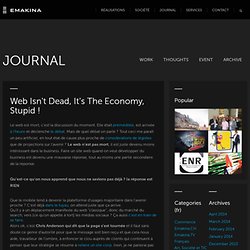
Qu’est-ce qu’on nous apprend que nous ne savions pas déjà ? La réponse est RIEN Que le mobile tend à devenir la plateforme d’usages majoritaire dans l’avenir proche ? C’est déjà dans le tuyau, on attend juste que ça arrive.Qu’il y a un déplacement manifeste du web “classique”, donc du marché du search, vers [ce qu'on appelle à tort] les médias sociaux ? Ça aussi c’est en train de se faire. Wired Declares The Web Is Dead—Don’t Pull Out The Coffin Just Yet. The Web is dead, or at least in decline, declares Wired editor Chris Anderson in the magazine’s September cover story.
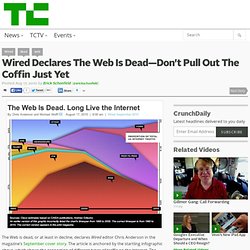
The article is anchored by the startling infographic above, which shows the proportion of different types of traffic on the Internet. The Web, HTML traffic visible though a browser, is only about a quarter (23%) of the overall traffic, down from about half a decade ago. It’s been pushed down by peer-to-peer (23%), video (51%), and other types of apps which use the Internet for transport but are not browser-based. Is the web really dead? Wired uses this graph to illustrate Chris Anderson and Michael Wolff's claim that the world wide web is "dead.
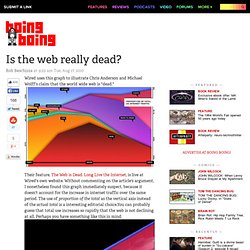
" Their feature, The Web is Dead. Long Live the Internet, is live at Wired's own website. Without commenting on the article's argument, I nonetheless found this graph immediately suspect, because it doesn't account for the increase in internet traffic over the same period. The use of proportion of the total as the vertical axis instead of the actual total is a interesting editorial choice.You can probably guess that total use increases so rapidly that the web is not declining at all.
Perhaps you have something like this in mind: L'Internet est-il "fini, dépassé et obsolète" ? Certains personnages publics avancent cette thèse. L'artiste le plus égocentrique de la planète, Prince, vient de faire une déclaration choc lors d'une interview qu'il a accordée il y a quelques jours au journal anglais Daily Mirror, à l'occasion de la sortie imminent de son nouvel album 20Ten.
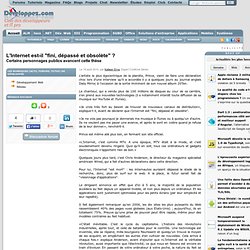
Le chanteur, qui a vendu plus de 100 millions de disques au cour de sa carrière, s'en prend aux nouvelles technologies (il a notamment interdit toute diffusion de sa musique sur YouTube et iTunes). «Je crois très fort au besoin de trouver de nouveaux canaux de distribution», explique-t-il, avant de déclarer que l'Internet est "fini, dépassé et obsolète". «Je ne vois pas pourquoi je donnerais ma musique à iTunes ou à quelqu'un d'autre. Ils ne veulent pas me payer une avance, et après ils sont en colère quand je refuse de la leur donner.», renchérit-il. Prince est même allé plus loin, en fermant son site officiel.